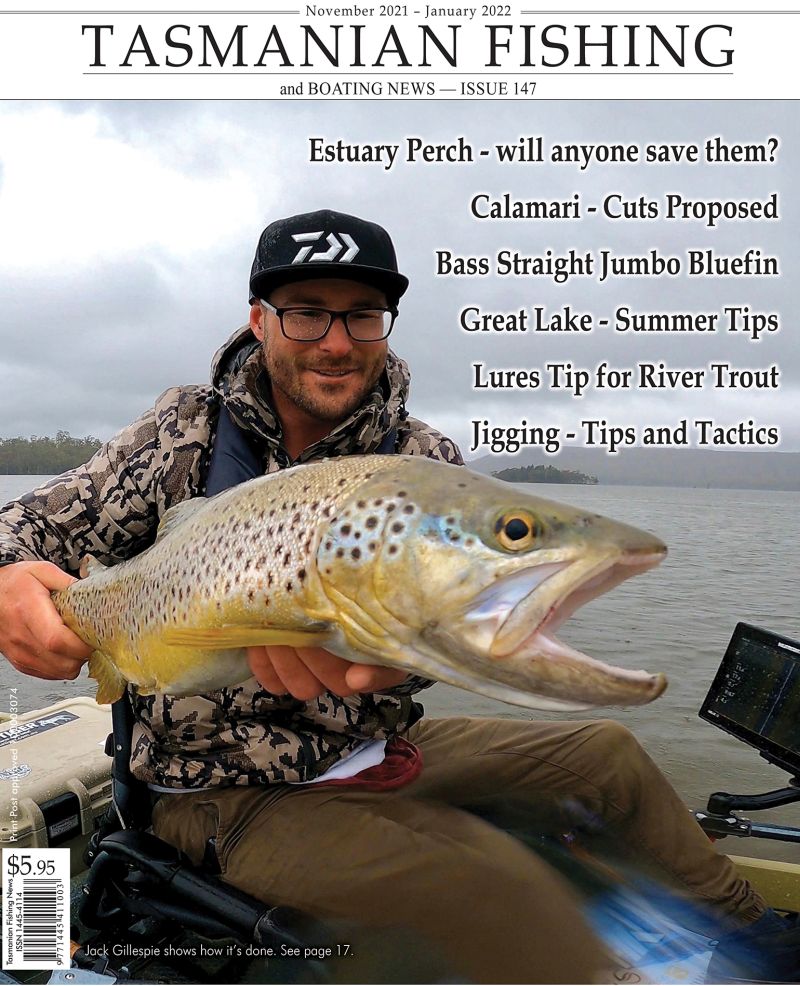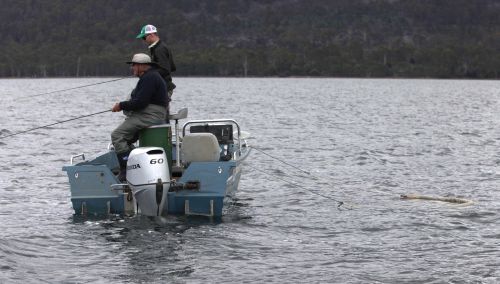From the Archives ...
Sea Run Trout
Mid Sea-Run Season Report
Sea-run trout fishing this year got off to a cracking start in most areas, with the majority of anglers employing nearly every trout fishing technique to secure fish in local estuaries statewide.
Even those anglers fishing the "off-season" lower down in our estuaries for sea-trout commented on the number of fish moving in early August.
Please check all relevant authorities before fishing - www.ifs.tas.gov.au and dpipwe.tas.gov.au . Don't forget issuu.com/stevenspublishing for years of back issues !
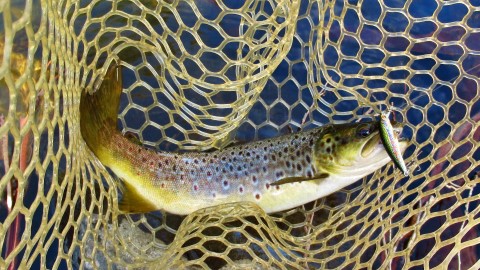 Seeing as I pulled up a little stiff from yesterday's spin session I waited until 2:15 pm before I headed off to have a late afternoon spin in the fast waters of the Meander River. My last trip to these fast waters wasn't a good one, all I managed that day was seeing two trout follow the lure and that was it. The water level is down to 57cms which is ideal for wading the fast waters I'm heading to. It was 2:55 pm by the time I entered the river and it looked great, the only thing I had to contend with was the rocky river bottom, the rocks were a little slippery under foot. I started the session off with a #0 March Brown Bug and it wasn't all that long when I had a trout have a go at it, it missed getting hooked. Still, that was a good sign and I felt like I could be in for a good time fishing the fast waters this afternoon. I was concentrating on casting the spinner into the flat waters along the opposite side of the river, they're the areas that the trout will be holding out waiting to grab anything that passes by. It wasn't all that long after seeing the first trout when another fish followed the March Brown for several meters before it turned and moved off.
Seeing as I pulled up a little stiff from yesterday's spin session I waited until 2:15 pm before I headed off to have a late afternoon spin in the fast waters of the Meander River. My last trip to these fast waters wasn't a good one, all I managed that day was seeing two trout follow the lure and that was it. The water level is down to 57cms which is ideal for wading the fast waters I'm heading to. It was 2:55 pm by the time I entered the river and it looked great, the only thing I had to contend with was the rocky river bottom, the rocks were a little slippery under foot. I started the session off with a #0 March Brown Bug and it wasn't all that long when I had a trout have a go at it, it missed getting hooked. Still, that was a good sign and I felt like I could be in for a good time fishing the fast waters this afternoon. I was concentrating on casting the spinner into the flat waters along the opposite side of the river, they're the areas that the trout will be holding out waiting to grab anything that passes by. It wasn't all that long after seeing the first trout when another fish followed the March Brown for several meters before it turned and moved off.
- Written by Stephen Smith - Rubicon Web and Technology Training
- Category: Meander River
- Hits: 1579
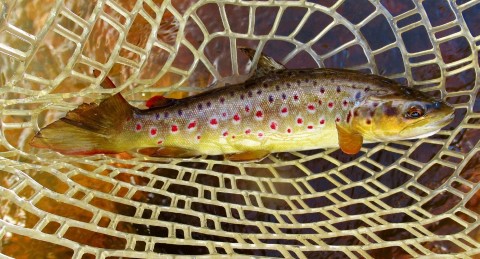 I am sure that the majority of those who trout fish don't bother to check out small streams to see if there may be any trout in them. Well, for me I am one who loves to fish these small streams because most of them that flow into a large river will have trout in them. When fishing small out of the way small streams you will come across quite a few log jams, some are small and are quite easy to climb over or go around if that's possible. Then there's the large log jams that can be a real challenge if there's no way around them due to high river banks or heavy foliage that's full of blackberry bushes. Log jams are just a part of small stream fishing and one has to take the good with the bad at times, that's really the worst thing one has to contend with. Yes it can be tough at times, it's also very rewarding when you catch your first trout in a small out of the way stream.
I am sure that the majority of those who trout fish don't bother to check out small streams to see if there may be any trout in them. Well, for me I am one who loves to fish these small streams because most of them that flow into a large river will have trout in them. When fishing small out of the way small streams you will come across quite a few log jams, some are small and are quite easy to climb over or go around if that's possible. Then there's the large log jams that can be a real challenge if there's no way around them due to high river banks or heavy foliage that's full of blackberry bushes. Log jams are just a part of small stream fishing and one has to take the good with the bad at times, that's really the worst thing one has to contend with. Yes it can be tough at times, it's also very rewarding when you catch your first trout in a small out of the way stream.
- Written by Stephen Smith - Rubicon Web and Technology Training
- Category: Trout Fishing
- Hits: 1632
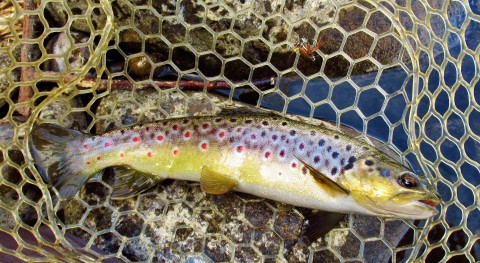 Overcast, humid conditions and the perfect water level was enough for me to head over to the Meander River for a spin session. It was 6:45 when I hit the water and it wasn't all that long before I had the first trout of the morning take the #0 March Brown Bug spinner, the only problem was it tossed it as fast as it took it. Two casts later I was onto another trout, this little brown stayed on and I had the first fish of the day in the net. It's been around a month since I last fished this stretch of river and this stretch of water I'm fishing didn't give up a single fish, this was a good start to what I normally have here. The river here was perfect for casting and drifting too which was even better as It's one of my favourite ways of spin fishing. There's nothing better than watching the Mepps inline spinner drift with the flow and a trout sitting right up behind it, then it's up to me to get that trout to take the spinner.
Overcast, humid conditions and the perfect water level was enough for me to head over to the Meander River for a spin session. It was 6:45 when I hit the water and it wasn't all that long before I had the first trout of the morning take the #0 March Brown Bug spinner, the only problem was it tossed it as fast as it took it. Two casts later I was onto another trout, this little brown stayed on and I had the first fish of the day in the net. It's been around a month since I last fished this stretch of river and this stretch of water I'm fishing didn't give up a single fish, this was a good start to what I normally have here. The river here was perfect for casting and drifting too which was even better as It's one of my favourite ways of spin fishing. There's nothing better than watching the Mepps inline spinner drift with the flow and a trout sitting right up behind it, then it's up to me to get that trout to take the spinner.
- Written by Stephen Smith - Rubicon Web and Technology Training
- Category: Meander River
- Hits: 1530
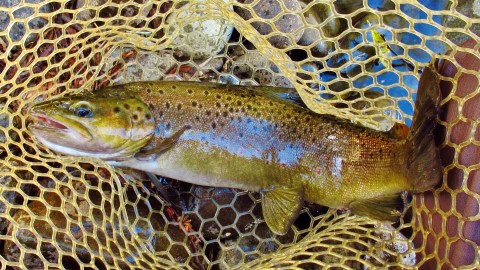 Well, another trout season has come to an end and for me it was one that had quite a few ups and downs in the rivers which had a lot to do with the weather conditions. At the start of the 2021/22 trout season I set myself a target of 500 trout and thankfully I did manage to reach it on the 18th April, I went on to end the season with a total of 536 trout caught in 90 trips, of which four were kept due to gill damage. The three large rivers I fished were the Mersey, Meander and Leven all of which had some problems with them. The Meander & Leven were two that had a lot of green cotton like algae on the river bottom on each and every trip I had to them. The Mersey River was the worst river of all, not only was the river bottom in poor condition with it being full of silt and slime on the rocky river bottom, it was the water weeds that made fishing a waste of time in the upper reaches in and around Weegena. Wading & fishing in the river when it's full of water weeds was near impossible in several stretches of the river, long strands of weed wrapped around one's legs while heading upstream and it was much worse when the water level was low. As for the trout in the three large rivers my catches were mainly small to medium size fish with the odd large fish being far and few between, only twenty three trout of the 341 trout caught in the Mersey, Meander were over the five hundred gram mark. The three trips I had to River Leven, the biggest trout out of the twenty six fish caught went 460 grams, though I did lose a couple of trout that would have been in the five hundred gram plus range. The small tannin waters I fished were down in fish numbers this season for some reason, in thirty one trips I caught and released 119 trout compared to last season's thirty two trips for 197 trout being caught and released. I feel low water levels may have had a lot to do with it throughout the trout season. The other small river I fished (on private property) nine times during the season was the Dasher, that small river gave up 48 trout all of which were very small fish, the best weighing in at 350 grams. Western Creek was a short spin session that I had on the way home where I caught and released two small browns in very low water.
Well, another trout season has come to an end and for me it was one that had quite a few ups and downs in the rivers which had a lot to do with the weather conditions. At the start of the 2021/22 trout season I set myself a target of 500 trout and thankfully I did manage to reach it on the 18th April, I went on to end the season with a total of 536 trout caught in 90 trips, of which four were kept due to gill damage. The three large rivers I fished were the Mersey, Meander and Leven all of which had some problems with them. The Meander & Leven were two that had a lot of green cotton like algae on the river bottom on each and every trip I had to them. The Mersey River was the worst river of all, not only was the river bottom in poor condition with it being full of silt and slime on the rocky river bottom, it was the water weeds that made fishing a waste of time in the upper reaches in and around Weegena. Wading & fishing in the river when it's full of water weeds was near impossible in several stretches of the river, long strands of weed wrapped around one's legs while heading upstream and it was much worse when the water level was low. As for the trout in the three large rivers my catches were mainly small to medium size fish with the odd large fish being far and few between, only twenty three trout of the 341 trout caught in the Mersey, Meander were over the five hundred gram mark. The three trips I had to River Leven, the biggest trout out of the twenty six fish caught went 460 grams, though I did lose a couple of trout that would have been in the five hundred gram plus range. The small tannin waters I fished were down in fish numbers this season for some reason, in thirty one trips I caught and released 119 trout compared to last season's thirty two trips for 197 trout being caught and released. I feel low water levels may have had a lot to do with it throughout the trout season. The other small river I fished (on private property) nine times during the season was the Dasher, that small river gave up 48 trout all of which were very small fish, the best weighing in at 350 grams. Western Creek was a short spin session that I had on the way home where I caught and released two small browns in very low water.
- Written by Stephen Smith - Rubicon Web and Technology Training
- Category: Trout Fishing
- Hits: 1809
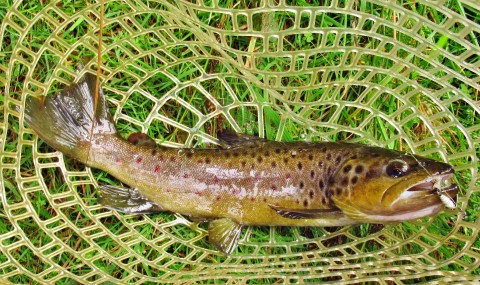 Seeing as I only need another three trout to reach the 500 trout target I set myself for this season I decided not to wait another day to reach it. With rain forecast for all of tomorrow I made the decision to head off to my favourite tannin water to see if I could get it over and done with. It was 3:05 pm by the time I hit the river which was a little on the low side but still deep enough thanks to the 6 mms of rain we had yesterday. I started the session off using a small copper #00 Aglia inline spinner thinking that the copper colour would stand out better in the dark water.
Seeing as I only need another three trout to reach the 500 trout target I set myself for this season I decided not to wait another day to reach it. With rain forecast for all of tomorrow I made the decision to head off to my favourite tannin water to see if I could get it over and done with. It was 3:05 pm by the time I hit the river which was a little on the low side but still deep enough thanks to the 6 mms of rain we had yesterday. I started the session off using a small copper #00 Aglia inline spinner thinking that the copper colour would stand out better in the dark water.
- Written by Stephen Smith - Rubicon Web and Technology Training
- Category: Trout Fishing
- Hits: 1547
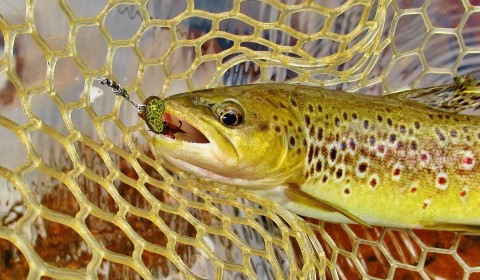 With the river level being low I felt it was time to check it out and see if I could catch a few wild brown trout in the Gunns Plains area. The weather was going to be pretty good with patches of cloud and a temperature in the low twenties, the only problem was going to be the Easterly wind that was due sometime during the day. Today was one of my earliest starts of the season, I was in the river by 6:35 am, it was a beautiful cool peaceful morning to be in the river too. The first thing I noticed in a long, wide, deep stretch of river were trout surface feeding in quite a few areas but mainly on the shallower left hand side of the river.
With the river level being low I felt it was time to check it out and see if I could catch a few wild brown trout in the Gunns Plains area. The weather was going to be pretty good with patches of cloud and a temperature in the low twenties, the only problem was going to be the Easterly wind that was due sometime during the day. Today was one of my earliest starts of the season, I was in the river by 6:35 am, it was a beautiful cool peaceful morning to be in the river too. The first thing I noticed in a long, wide, deep stretch of river were trout surface feeding in quite a few areas but mainly on the shallower left hand side of the river.
- Written by Stephen Smith - Rubicon Web and Technology Training
- Category: Leven River
- Hits: 2125
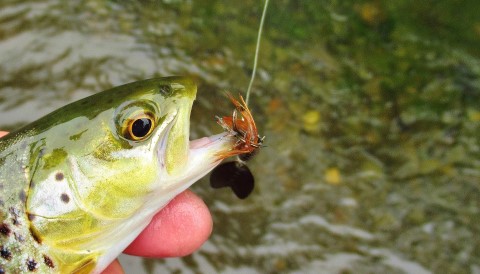 As much as I wanted to do today, fast water fishing was taken off my where to fish list, I still headed to the same river and started the spin session in the slower flowing waters of the Meander River. The same waters where the river bottom is covered in green algae and brown slime, the water level was up by 40mms so that gave a little more space between the lure and the river bottom today. I was in the river by 7:10am this time, a little earlier than my last trip here, I started off using a #0 Mepps March Brown Bug spinner only to have it fouled by the green algae that was drifting down the river.
As much as I wanted to do today, fast water fishing was taken off my where to fish list, I still headed to the same river and started the spin session in the slower flowing waters of the Meander River. The same waters where the river bottom is covered in green algae and brown slime, the water level was up by 40mms so that gave a little more space between the lure and the river bottom today. I was in the river by 7:10am this time, a little earlier than my last trip here, I started off using a #0 Mepps March Brown Bug spinner only to have it fouled by the green algae that was drifting down the river.
- Written by Stephen Smith - Rubicon Web and Technology Training
- Category: Meander River
- Hits: 1538
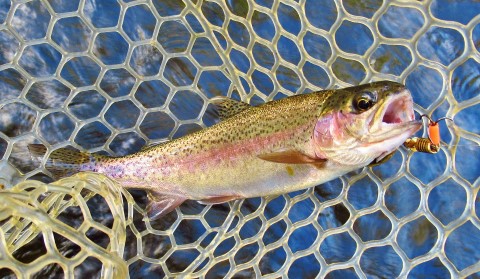 Sometimes things are never as easy as they sound, two days left in January to catch two trout to reach my 350th for the season, should be quite easy shouldn't, well it wasn't. Here's how I struggled to reach it. Never take things for granted.
Sometimes things are never as easy as they sound, two days left in January to catch two trout to reach my 350th for the season, should be quite easy shouldn't, well it wasn't. Here's how I struggled to reach it. Never take things for granted.
Trip one. Small tannin stream, 7:55 am to 10:30 am.
As the title states, getting my 350th trout wasn't easy at all, with just two trout needed to reach it I certainly did it the hard way. Every time I get close to achieving something, for one reason or another it never comes easy for me. In a way I suppose that's a good thing, but just for once it would be nice to reach it without any hiccups along the way. Like today for instance when I headed over to one of my favourite small tannin streams where I thought it would be a simple matter catching two trout to reach the 350th trout before the end of January. Now I don't normally fish the small tannin waters at this time of the year unless we've had some decent rainfall which we did have a week ago. When I arrived at the stream I could see it was on the low side but to me it still looked good enough to hop in and catch a few trout. The tannin water was still on the dark coloured side of things which I felt would be in my favour so I started the session off with a small #00 copper Aglia Mouche Rouge inline spinner.
- Written by Stephen Smith - Rubicon Web and Technology Training
- Category: Meander River
- Hits: 1292
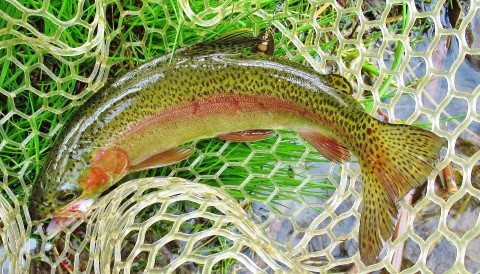 A cool change is on its way so I thought I had best get a spin session in before it arrives as the day goes on, this trip was close to home, it was to the Mersey River at Kimberley. It's an area I've fished for many years and it used to be a great area to fish until we had the 2016 record floods. That flood changed the majority of the Mersey River system, after the floods most of my favourite areas were completely washed away, the river was just a wide open river with five bridges destroyed or severely damaged and most of the river foliage gone. When everything settled down and I returned to fish the river it was like I was fishing a new river, the river had changed so much.
A cool change is on its way so I thought I had best get a spin session in before it arrives as the day goes on, this trip was close to home, it was to the Mersey River at Kimberley. It's an area I've fished for many years and it used to be a great area to fish until we had the 2016 record floods. That flood changed the majority of the Mersey River system, after the floods most of my favourite areas were completely washed away, the river was just a wide open river with five bridges destroyed or severely damaged and most of the river foliage gone. When everything settled down and I returned to fish the river it was like I was fishing a new river, the river had changed so much.
- Written by Stephen Smith - Rubicon Web and Technology Training
- Category: Mersey River
- Hits: 1479
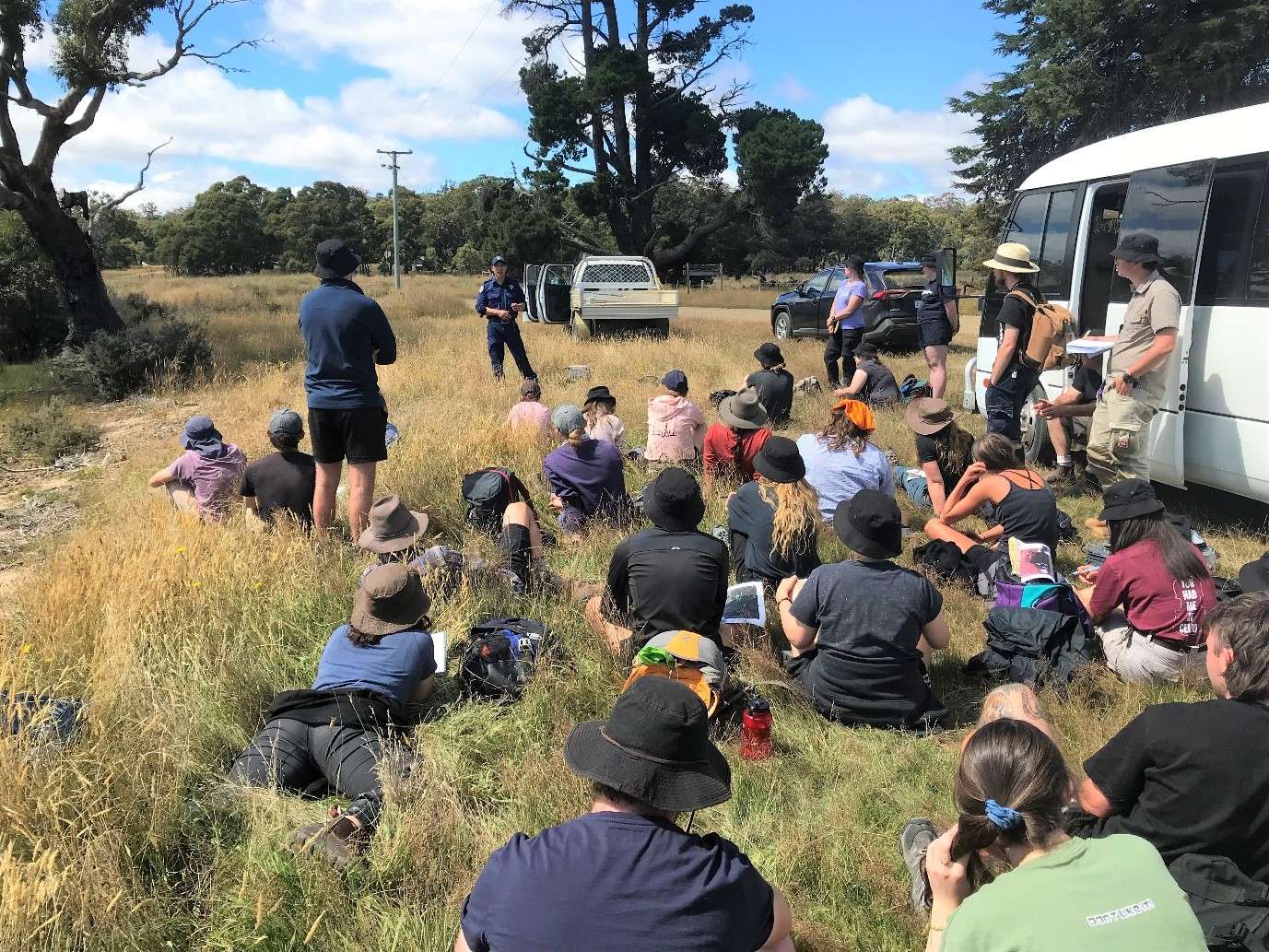 |
| Carp Management Program Leader Jonah Yick gives a presentation on the history and current status of carp in Tasmania to Utas Field Ecology students. |
In mid-February, 30 University of Tasmania (UTAS) students enrolled in the unit “Tasmanian Field Ecology”, visited Lake Sorell and Crescent to undertake vegetation and invertebrate surveys around the wetlands. The Interlaken Lakeside Reserve is internationally recognized under the Ramsar Convention on wetlands, and supports a range of threatened and protected flora and fauna. To commence the field trip, the students listened to a presentation given by the Carp Management Program Team Leader Jonah Yick, on the history of carp eradication in Lake Crescent, as well as an update on the ongoing carp eradication efforts in Lake Sorell. Jonah also gave the students a demonstration on the key techniques used to catch carp in the lakes, which included backpack electrofishers, gill nets, fyke nets, and radio telemetry equipment. This unit was coordinated by Associate Professor Leon Barmuta and Dr. Robert Wiltshire, who both taught Jonah over 17 years ago!
- Written by Stephen Smith - Rubicon Web and Technology Training
- Category: IFS, DPIPWE, MAST and Peak Bodies
- Hits: 1458
Subcategories
Current TFBN
Click above for current issue content. The current issue of TFBN is extensive and topical. In Tackle Stores, Newsagents and by subscription.
Delivered to your door for $48 for 2 years (8 issues). To subscribe, send Mike $48 via www.paypal.com.au . (Basic instructions are here) The email is at Contact Us. Your address will be included from PayPal.
Or phone Mike with your c/c handy on 0418129949
Please ensure your details are correct, for Mike to organise delivery.
TFBN Newsletter Sign up Form
Why not submit an article ?
When you have finished for the day, why not have a brag about the ones that didn't get away! Send Mike an article on your fishing (Click here for contact details), and we'll get it published here. Have fun fishing - tasfish.com
Category Descriptions
Here is a list of all of the Article Categories. The number in Brackets, eg (13) is the number of articles. Click on Derwent River and all articles relating to the Derwent will be displayed in the central area.
Articles by Category
-
Rivers (3)
-
Saltwater and Estuary Fishing (149)
-
Kayak Fishing (34)
-
Lakes (1)
-
Great Lake (62)
-
Lake Leake (52)
-
Woods Lake (16)
-
Lake Augusta (11)
-
Huntsman Lake (13)
-
Lake Pedder and Gordon (10)
-
Lake Dulverton (5)
-
Lake Crescent (6)
-
Tooms Lake (10)
-
Lake Mackintosh (2)
-
Lake Barrington (5)
-
Little Lake (8)
-
Meadowbank Lake (5)
-
Lake King William (7)
-
Lake St Clair (2)
-
Western Lakes (12)
-
Arthurs Lake (35)
-
Lake Echo (7)
-
Four Springs (54)
-
Lake Sorell (7)
-
Lake Burbury (6)
-
Other Lakes (57)
-
Brushy Lagoon (18)
-
Little Pine Lagoon (5)
-
Penstock Lagoon (16)
-
Brumbys Creek (7)
-
-
Events (48)
-
Estuary Fishing (0)
-
Coastal Catches (46)
-
Super Trawler (46)
-
IFS, DPIPWE, MAST and Peak Bodies (435)
-
Commercial Interests (98)
-
Other (24)
-
TFBN Back Issues (8)
-
Fly Fishing (67)
-
Trout Fishing (252)
-
Meteorology and Weather (8)
-
Jan’s Flies (50)
-
Tuna Fishing and other Game Fishing (86)
-
Cooking Fish (19)
-
Fishing Information (1)
-
Fishing Books (8)
-
Videos (5)
-
Tackle, Boats and other Equipment (146)
-
World Fly Fishing Championship 2019 (2)
Popular Tags
windyty.com
Visit https://www.windyty.com/
Rubicon Web and Technology Training
Hello everyone, I thought it would be a good time to introduce myself.
My name is Stephen Smith and I have been managing the website tasfish.com since May 2009.
It has been an epic journey of learning and discovery and I am indebted to Mike Stevens for his help, support and patience.
I am developing a new venture Rubicon Web and Technology Training ( www.rwtt.com.au ). The focus is two part, to develop websites for individuals and small business and to train people to effectively use technology in their everyday lives.
Please contact me via www.rwtt.com.au/contact-me/ for further information - Stephen Smith.
From the Archives ... (last chance)
Atlantic Salmon At Large
Atlantic Salmon At Large
Recently Atlantic salmon seems to be a very hot topic amongst local anglers, especially those in the south of the state in the D'Entrecasteaux area. Northern anglers should take a close look at the Tamar as there are opportunities here as well.
The recent "great escape" has provided a perfect opportunity for fresh and saltwater anglers alike to experience some truly memorable sport. Tasmania's pristine, clean and cool waters are the perfect nursery for the Atlantic Salmon and as our local fish farms produce more and more fresh quality seafood it is a fact that there are going to be tangible consequences.

